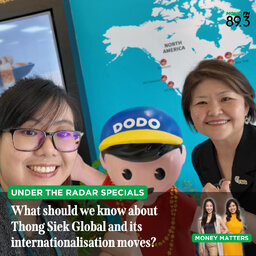Under the Radar: What is Emirates SkyCargo’s assessment of global and Singapore air freight demand amid port congestions?
We’re going to bring you an inside look into the air cargo industry today as we speak to the cargo arm of the world’s largest international airline.
Incepted in 1985, our guest Emirates SkyCargo prides itself as a facilitator of global trade, tapping Emirates’ global network of over 140 destinations across 6 continents to transport goods to all corners of the world.
The cargo arm prides itself as having an extensive cool chain capacity, including the world’s largest, EU GDP-certified pharmaceutical hub to transport sensitive cargo quickly, efficiently and reliably.
It operates two world-class cargo terminals at its dual-airport hub in Dubai, with a capacity of over 2.3 million tonnes per annum.
In Singapore, operations began in 1990 with direct flights from Dubai to Singapore and Manila. Since then, the airline has increased capacity to 3 freighter flights per week to strengthen trade links between the East and West.
More notably, Emirate SkyCargo transported over 18,600 tonnes of cargo in and out of Singapore in FY 23-24, with key exports from Singapore being ship and aircraft parts, pharmaceuticals, mobile phones and more, and key imports being fresh fruits and foodstuffs. But how important is Singapore’s air hub to Emirates SkyCargo?
Meanwhile, data from the International Air Transport Association or IATA released in July showed strong annual growth in demand in global air cargo markets in May.
With port congestion remaining an issue for the industry, what will this mean for Emirates SkyCargo in terms of prices and demand for air freight? Is the situation more or less pronounced in Singapore than around the world?
On Under the Radar, The Evening Runway’s finance presenter Chua Tian Tian posed these questions to Ravishankar Mirle, Vice President of Cargo Commercial, Far East & Australasia, Emirates SkyCargo.
In 3 playlist(s)
Under The Radar
We speak with businesses, industry leaders, venture capitalists and startups on their assessment of …Social links
Follow podcast
Recent clips

Under the Radar: What is next for semiconductor optics firm MetaOptics post-SGX listing and how does it assess the effectiveness of listing on the local bourse? Its CEO explains.
45:41

Under the Radar: (SPECIALS) All about the fishballs – what should we know about DoDo’s parent Thong Siek Global and its internationalisation moves? We head down to its factory floor to find out.
26:21

Under the Radar: How important is Work+Store for LHN Group post listing of Coliwoo?
24:45
 Under The Radar
Under The Radar

